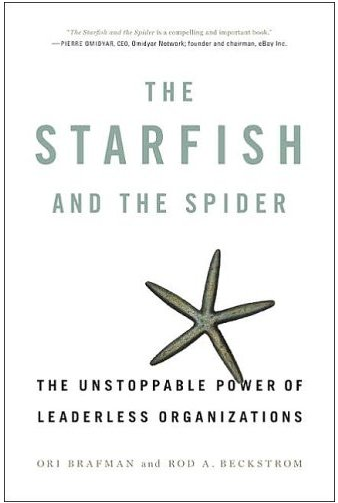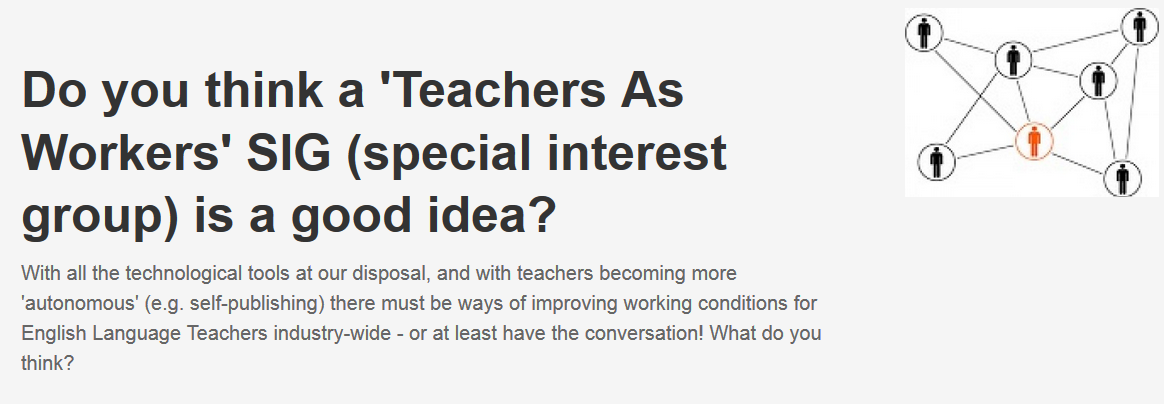Starfish facts – True or False?
– They can change their gender whenever they want
– They can regenerate a lost arm
– They are not actually fish – but sea stars
It’s a trick question – they’re all true!
Star fish, or sea stars are also keystone species. This means that they have a disproportionate effect on their ecosystems.
Now press play on the video and just relax…they’ll be more about starfish later.
I’ve been waffling on about decentralisation for months now. I did my 12 week experiment with a group of business english learners. I blogged about it. I proved that a decentralised syllabus can work in the classroom.
What’s next? Well, in this post I’m going to answer this question:
How can we use the concept of Decentralisation?
To start with, as I was in the middle of this project, synchronicity struck. I discovered that a social scientist called Jean-Paul Faguet had tackled one of the enduring paradoxes of Decentralisation in this book Decentralization and Popular Democracy: Governance from Below in Bolivia (2012). The paradox is :
Even though an estimated 80% of the world’s countries are experimenting with decentralisation reforms – there is no empirical proof that these reforms are successful.
If they aren’t successful –then why do countries continue decentralising?
The paradox was solved by thinking about incentives. In a previous post, I explained that there were three forms of Decentralisation.
Devolution – This is the strongest form of decentralisation whereby a central authority transfers decision-making power and functions to a lower level. The devolution of power from the U.K. parliament to Scotland would be a good example here; Scotland exercises clear authority over a wide range of functions e.g. setting education policy.
Delegation – Transfer of decision-making power to semi-autonomous institutions. However, these institutions are still accountable to the central authority. An example would be a public corporation or transport authority.
Deconcentration – Often thought of as the weakest form of decentralisation this redistributes decision- making power to different levels of the central organisation. For example, a field administration accountable to a central government ministry.
Faguet solved this problem by telling a story about incentives. If there is ‘true’ decentralisation then he describes this as a process of “letting go”. Decisions and actors are influenced by information at a lower level (not from above). There is also accountability to the local – not central – authority.
For example, in Scotland the government is responsive to local needs and local information, and doesn’t respond to interference from the U.K. government (in theory of course).
By this analysis, Delegation and Deconcentration are NOT real decentralisation because the incentives of officials go upwards – they respond to information and the preferences of the central authority. Put simply, why would the turkeys vote for Christmas?
This goes some way to explaining the mixed picture we have of decentralising reforms across the world. Those implementing reforms have the least interest in seeing them succeed!
What’s this got to do with ELT?
Well, no one is going to support a process that puts them out of a job. This may mean that some teaching approaches are sidelined by the industry e.g Learner Autonomy, Dogme, Task-based teaching because they can’t be monetized so easily. But PPP and level-based, discrete units of grammar can be easily organised and monetized into a book format. Innovative materials don’t make it onto the market because radical alternatives might disrupt traditional business models.
For example, how much marketing clout was put into promoting ‘Widgets’ a task-based business english course– even though teacher approval was high? I’m claiming that the ELT industry is incentivised primarily by the preferences of the market – NOT the preferences of teachers or learners. I’m not ‘hating’ on course book providers – I use coursebooks – I’m just trying to make a point. Course books are not learner-centred, but market-centred.
This creates a vicious circle: books are still largely based on PPP and weighted towards verb grammar – learners then form expectations of what a coursebook is or should be – these preferences become entrenched and innovation is discouraged. Naturally, I should also ask the question – how many teachers and schools bought ‘Widgets’? Of course, corpus-based research has affected materials development and this is to be welcomed – but it’s taken a long time. Tomlinson (2008:319-320) presents a ‘blacklist’ of the potentially negative characteristics of ELT materials:
- Underestimating learners
-
Overuse of PPP
-
Insufficient use of recycling
-
Excessive focus on practice of typical examination tasks
-
Failing to help the learners to make full use of the language experience available to them outside the classroom
What’s the answer then?
One answer would be to devolve more decision-making power to teachers. Why can’t I download/use/ adapt parts of the course book? I might even pay for this service!
I have to admit here that some publishers are ahead of the game. Oxford University Press offers a lot of downloads and I’ve been using their ‘Expressions cards’ for Business Result for years – students love them!
But more could be done to apply the principle of granularity.
But how will publishers make money if they offer free downloads?
How are record companies making money now? They diversified, changed, adapted. Ori Brafman and Rod Beckstrom in their book The Starfish and the Spider: The Unstoppable Power of Leaderless Organizations mention several principles of Decentralisation. Two that are relevant here are:
Fifth principle of decentralization: “the decentralized organization sneaks up on you”. Who would have guessed that an online encyclopaedia – Wikipedia – would become such a reliable source of information?
Sixth principle of decentralization: “as industries become decentralized, overall profits decrease”. What happened to the revenues of the major record companies after Napster, torrents and other forms of piracy? The revenue disappeared.
Another answer to the shortcomings of published materials is to Do It Yourself. Individual teachers are sharing lessons and materials for free – Jamie Keddie’s excellent site being one of my favourites. Teachers are also coming together to create their own materials to address the shortcomings of published materials such as this group of teachers in Argentina. The Round also provides a home for more innovative and critical materials. This trend can only continue and therefore perhaps the publishers should start thinking about this new environment.
As Brafman and Beckstrom say in their book:
“Flatten or be flattened”.
So how can we use the concept of Decentralisation?
The concept of Decentralisation is a tool we can use to examine the mainstream ELT industry. The conclusion I draw is this: we can’t expect the industry to reform itself. It just doesn’t possess the incentives. Of course, there are niche publishers working at the margins and fantastic schools where all the teachers are happy with their lot. But perhaps the exceptions just prove the rule.
As a result, what I’m interested in is change in ELT. I’m talking about teacher-led change from the bottom up.
So the mainstream ELT industry is conservative – what’s new?
Maybe my analysis is nothing new. So let’s do something new.
Like a starfish, the Special Interest Groups in IATEFL function as decentralised groups of teachers working on a common theme. That’s why myself and Nicola Prentis are looking into forming a ‘Teachers as Workers’ SIG to have a conversation about working conditions in the ELT industry, with the aim of improving conditions for all. But first we would like the opinions of as many teachers as possible. Do you think this is a good idea?
If you’ve voted already – thanks! Around 60 teachers have voted so far. If you haven’t, please vote in the poll – it closes tomorrow!
I’ll publish the results after Tuesday – thanks for your support!
paul



About the Teachers As Workers SIG: The message seems a little confused. It could be read as an expression of solidarity with the other members of the proletariat. Teachers are workers too. Workers of the world unite. But in the blurb underneath you take it in a different direction: “With all the technological tools at our disposal, and with teachers becoming more ‘autonomous’…” The classical definition of the worker is someone who has been dispossed, someone without the means of production who can only make ends meet by selling their labour power and signing away their autonomy. Your teacher-worker is spun differently, and is indistinguishable from the sort of entrepreneur that Norman Tebbit would have been proud of.
Surely that autonomy is merely a pseudo-autonomy since the isolated teacher trying to make ends meet on her laptop ends up having to yield entirely to the dictates of the market. The hallowed new technology does not itself create a new forum independent of the market in which people’s ideas about education can be challenged in a way that will actually have consequences for educational practice. On the contrary, the technology seems to facilitate rather than hinder the entrenchment of market forces. And does this not effect the proletarianisation of the teacher – her alienation from anything that could effectively challenge the commodification of everything?
Hi torn halves,
Sorry but I think my wording is clear in the poll. I added ‘for example, with self-publishing’ in the poll. I didn’t mention politics at all – you’re bringing politics into it. What I meant was teachers are becoming more autonomous because they can set up blogs, do courses online, and even self-publish. Isn’t self-publishing a form of owning the means of production? You needed a printing press to publish anything 30 years ago, now you don’t. Democratisation has it’s disadvantages such as how to make a living if you’re a novelist/ journalist/ writer, but there you go.
Anyway, I’m certainly not trying to ‘spin’ anything, and your jibe about Norman Tebbit is not particularly well-taken, but a good try at getting me riled/ bordering on trolling. Don’t have time to take the bait I’m afraid.
With autonomy and pseudo-autonomy you lose me. I don’t think pseudo-autonomy is a useful analytical category.
Do you think the idea is good or not – if so vote yes, if not, no.
thanks for the comment,
paul
Just to clarify, Paul. I thought the idea might have been a good one (if the intention had been clarified) and I voted Yes.
The issue of clarity (and the point of the reference to Tebbit) has to do with the fact that there is a certain amount of positive talk about teachers becoming entrepreneurs (a very market-friendly discourse). Now, entrepreneurs are, in one sense, workers. But the idea of the Worker also belongs to a different discourse that is skeptical about the market and is concerned about the fate of the worker as someone subject to various forms of alienation – a discourse quite opposed to the one singing the praises of the new opportunities for entrepreneurs.
Given the political nature of your blog and your Facebook posts, we assumed that your intention in referring to teachers as workers was to join forces with the latter discourse. From the comment just given, that assumption would seem to be false.
I am sceptical about market-based solutions, yes – does that answer your question? And I do support teachers as workers (hence the proposed name of the SIG). But I don’t think this blog is primarily political.
cheers
The YES’s have it! YES= 66, NO = 17 DON’T KNOW = 3
Thanks for your support everyone!
https://twtpoll.com/teachersasworkers/1/whyt85irabu2f1p